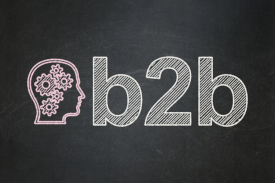
Does the competitive intelligence firm think that sales cycles are measured in minutes and days, or months and years?
“Consumer tech” and “impulse buy” are nearly synonymous phrases. This leads to sales cycles that are merely days, or even minutes long.
The B2B technology sector isn’t even remotely similar. Even for areas in which the market is highly commoditized (e.g., CRM/marketing automation), the time line for a purchase decision can take weeks or months as multiple competitors are evaluated.
Compare this with the amount of deliberation that goes into the average Super Bowl-week purchase of a flat-screen TV and you’ll see the difference. That’s the definition of “impulse buy” in America.
In sum, B2C purchases are measured in days, hours, and minutes. B2B purchases, not so much. Think more about weeks, months, or years. Work with a firm that understands that.
Can the competitive intelligence firm talk as much about the “ity’s” —reliability, security, interoperability, and manageability as much as usability?
In consumer tech, usability rules, but in B2B tech, the reliability (measured in hundredths or thousandths of a second of downtime), security, manageability, and interoperability of a solution matter just as much.
Firms that can truly understand what these things mean in an enterprise or SMB context are the ones that can fully unpack what’s happening in a B2B tech sales, marketing, or product development cycle.
What are their thoughts on Best Buy?
Software, services, and hardware companies that focus on the B2B technology sector usually attempt to create extensive partner ecosystems. These ecosystems are then set alongside a complex multilayered field sales force and associated marketing effort.
In short, B2B technology-focused firms don’t sell much through Best Buy or typical consumer-oriented channels, and hence you won’t hear much discussion of these channels during a B2B-focused research study.
In sum, ask the firm what role they think Best Buy has to play.
If they say limited or none, you’re looking at a B2B-focused technology firm. If they think Best Buy has a big role to play, you’re talking to a B2C-focused technology firm.
Amazon isn’t a retailer — they are a cloud services player
Another easy litmus test you can use to determine whether you’re talking to a B2B or B2C technology-focused firm is how they look at Amazon.
If the firm talks up how Amazon sells hair dryers at low margins as well as K-Cups, you can bet you’re talking to a B2C firm. If they talk about Amazon’s investment in EC2, Eucalyptus, and S3, you’re talking to a B2B firm.
In closing, understand that B2B technology is a clearly different beast than B2C technology. So make sure you work with a firm that understands the difference.

